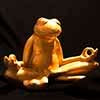Last night was the longest night of the year; did you notice it? Yesterday was the winter solstice 冬至 when northern hemisphere receives the least sunlight. A popular Chinese custom to get you through the long night is to have family together to have ball shape dumplings 湯圓 made of sweet rice flour with various kinds of filling. Although it is much harder to do so nowadays, luckily Christmas will be upon us in a few days after winter solstice when most people do have time off to be together. Better yet, these dumplings are available year-round from Chinese stores, thanks to the modern food preservation and transportation methods.
Don’t recall exactly when it started, but the greeting “Merry Christmas” has often been replaced by the more politically correct greeting of “Happy Holidays”. The problem is I have had a hard time to name specific holidays other than Christmas and New Year. How many major religious holidays are there around this time of the year anyway?
The most popular one is of course Christmas on December 25th of the Gregorian calendar. This shouldn’t surprise anyone since over 75% of the population in U.S. consider themselves Christians to begin with. For those who don’t concern themselves with the history of it, it suffices to know that the day was meant to honor and celebrate the birth of Jesus of Nazareth or Jesus Christ (the word Christmas itself comes from Latin that means “the Mass of Christ”). For those who are more curious, I like Issac Newton’s suggestion that the choice of the Dec 25th date was meant to tag it to the winter solstice that seems to be consistent with the early beliefs of the connection of birth of Jesus to the “rebirth of sun” (for northern hemisphere!).
Anyhow, over the centuries with many twists and turns in the interactions of social, political and religious forces and circumstances, Christmas has evolved to become the most prominent holiday in the Christian-dominated world. However, it would not have been as popular if it were limited to be a religious event. The blurring of those boundaries and incorporation of secular and pagan’s customs in observance such as the myth of Santa Clause allows it to become popular and accepted by many countries in modern world today. Further, with its gift-giving custom, it has become tightly knitted with our economic fabric and “Christmas Shopping Season” is critical for practically all consumers and merchants, Christians or not.
When we first moved to New Jersey in 1979, we noticed near Christmas day, windows of some of our neighbors displayed a special candelabrum of nine-branched Menorah. We later learned that it is used by Jewish for the eight-night observation of Hanukkah (from the Hebrew word for “dedication”), the Festival of Lights. The celebration, from sunset to sunset, starts on the 25th of Kislev, the ninth month of the ecclesiastical year on the Hebrew Calendar. It is for the commemoration of the rededication of The Second Temple in Jerusalem of the successful Maccabees rebellion against king Antiochus IV Epiphanes of the Hellenistic Seleucid Empire in 2nd BCE. According to the legend, the Temple was purified and the wicks of the menorah miraculously burned for eight days, even though there was only enough sacred oil for one day's lighting. Thus the observation and ritual includes the kindling of one light at the nightfall of each of the 8 nights and a series of family and communal rituals are performed.
Unlike Christmas, Hannkkah remains a religious/cultural holiday and is now one of the most significant symbol of Jewish identity. Interestingly, the tradition includes giving Hanukkah gelt (Yiddish for "money") to children. I was told however many families nowadays give gifts as well, responding to the “peer pressure” from the popular Christmas gift giving custom.
For Islam, since Islamic Calendar is a pure lunar calendar that is not synchronized with the solar calendars (most lunar calendars are actually Lunisolar calendars), it is not possible to identify religious holidays that always take place around this time of the year. It so happens that for 2008, one of the most important Islamic holidays had just taken place. It is the Eid ul-Adha, Festival of Sacrifice, celebrated by Muslims worldwide to commemorate the willingness of Ibrahim or Abraham to sacrifice his son for Allah, the Arabic term for God. It is on the 10th day of Dhu al-Hijja, the twelfth and final month in the Islamic Calendar and the festivals last for three or more days depending on countries. The festival marks the end of the Pilgrimage or Hajj to Mecca each year for the millions of Muslims. People dressed in their finest clothing go to mosques to pray. Those who can afford sacrifice their best domestic animals and give large portion of the meat to the poor. The remainder is then shared with family and relatives.
All three religions above - Judaism, Christianity, and Islam are monotheistic and closely related. They all revere Abraham in the Book of Genesis as the founding patriarch and thus referred to Abrahamic religions by scholars. They diverge on biblical interpretations and beliefs was further complicated by many issues including the contention for the land of Canaan. The result is more than one thousand years of conflicts and wars in many regions without clear resolution in sight. Almost two thousand years ago in China, Cao Zhi曹植 wrote the following famous poem within the 7 paces deadline that his King brother Cao Pi曹丕 gave him and escaped the execution: 煮豆燃豆萁,豆在釜中泣。本是同根生,相煎何太急。 It says essentially “We both come from the same root. Why are you then after me so much?”
Yes, we are all brothers of the same root. Why are some of us so eager to harm each other?
Happy Holidays and Peace!

